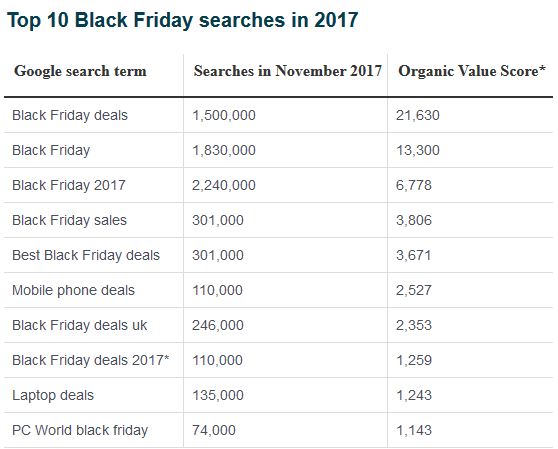Black Friday: The biggest consumer event of the year?
The term Black Friday conjures up those scenes we’ve all seen on the news of frenzied chaotic shoppers grabbing anything they can get their hands on, seemingly regardless of whether they actually want the item. Undoubtedly, Black Friday is one of the biggest consumer shopping days of the year and generates billions of pounds in sales as retailers offer some of their most competitive deals of the year to customers. The annual event has become ever-bigger, year-on-year and is now perceived to mark the beginning of the Christmas shopping season. This year it will take place on Friday 23rd November. However, retailers typically release their deals much earlier, often lasting one or two weeks, and incorporating Cyber Monday (Monday 26th November 2018), another day dedicated to discounts by online retailers. As Black Friday falls before Christmas, the previously largest sales day, Boxing Day, is experiencing a decline in sales, as customers get ‘shopped out’ by the time it comes round, resulting in Boxing Day sales losing their appeal.
So where did Black Friday come from?
Black Friday originated in the US and always falls on the day after Thanksgiving. In the US, Americans are generally given several days off work for this holiday, therefore, US retailers saw it as a prime opportunity to make extra money by offering great savings on products. The day was given its name because it is considered the period before Christmas that retailers ‘move into the black’, meaning they are in a strong financial position and have enough money to cover their costs while reducing prices.
In the past, many shops have been known to release details of their discounts and offers at the very last moment, before their deals go live. Some also increase their offers, where stock persists, as the days go on, often resulting in sell-outs. Retailers can also be expected to stay open for longer and many offer online discounts and promotions now too.
The supermarket Asda takes credit for bringing Black Friday to the UK over a decade ago; however, they no longer participate, due to incidents of fights and brawls in stores across the UK, which one year saw customers wrestling over a television at an Asda store in Wembley. Instead, they offer alternative discounts on selected products that run on for longer instead of flash sales.
What to expect in 2018?
In 2018, we can expect Black Friday to see many retailers offering their deals and discounts for longer in the weeks leading up to Christmas. In recent years, when Black Friday deals were more akin to flash deals that lasted 24-hours or until stocks lasted, shopping centres were flooded with out-of-control consumers running in to stores as the doors open and fighting with other customers to grab the last products on the shelf. But with many retailers now dragging out their deals over many days, and in some cases weeks, to avoid the peak in footfall, and with many consumers opting to shop online, retailers are having to become more competitive with their offerings, as consumers have more time to research and consider the best deals. Footfall this year is expected to drop by 3.7% compared with Black Friday last year, and by 2.7% over the weekend as a whole, according to reports by The Springboard Group. Meanwhile, online transactions are expected to increase by 4% this year, although year-on-year growth of online sales has been at a slower pace compared to last year.
How does Black Friday affect marketing strategy?
In November 2017, Google search encountered approximately 2,240,000 hits of the search term “Black Friday 2017”, meanwhile in this same period UK shoppers spent £1.4bn online, 11.7% more than the previous year. Without a doubt, it would be a missed opportunity if a business taking part didn’t optimise their website for SEO purposes to target searches around Black Friday Deals and drive their audience to a Black Friday-specific landing page, particularly for an e-commerce site. However, with many other retailers and businesses doing the same, the competition is soaring. Black Friday planning should therefore start well in advance. In-fact, the bigger retailers will have a consistent year-round Black Friday webpage on their website to secure themselves a space in the search engine’s index, which may also start to develop some traffic from as early as August, when consumers start thinking ahead of the deals. Once the page is established, you can work to improve the user and page experience; which will help improve your search engine ranks. A month or so in advance of the big day the marketers are busy. We are seeing Black Friday paid ad campaigns pop up, re-marketing kicking in and social media ads start appearing in our feeds, not to mention the flurry of promotional emails filling up our inboxes.

With retailers fighting one another to offer the best deals and competitive prices, strategies such as offering exclusive access to the first 100 customers, incentives for free products or entries into competition draws can help to make brands stand out. Some businesses may also take a more ethical approach to the event and donate a percentage of profits made to their favourite charity.
Many brands/businesses will also join forces with other retailers or make partnerships with publishers to further increase their audience reach. In 2017, one of the most shared content pieces from a UK-relevant website was a news article detailing Virgin Train’s Black Friday Offer in the Liverpool Echo. Whilst it was not a very long piece, it still managed to capture 7,700 engagements on Facebook alone.
In this cyber age, people who fall into the categories of ‘influencer’ or celebrity can also be found promoting products to consumers through social media and PR. Around the Black Friday event, we can expect ‘famous’ faces at the forefront of brand campaigns, promoting a variety of “unmissable” Black Friday offers.
Are retailers really offering the best deals of the year?
The whole frenzy around Black Friday attracts massive hype and makes customers feel pressured to spend their money or miss out on the “biggest deals of the year”. But according to research by idealo.co.uk, 9 out of 10 products included in Black Friday deals are actually cheaper at other times in the year. The report analysed 21,047 products over a 12-month period and found that only electricals such as laptops were offered at a bargain price, whilst most other products could be found cheaper during different sales and times of the year. The report also revealed that the most popular products to purchase over the Black Friday event were smartphones, but on average they were £72 cheaper in early August.
Some retailers may also feel that Black Friday discounts are counter-productive and are therefore reluctant to offer a significant discount. As Black Friday typically brings Christmas spending forward to mid-November, naturally they see a decline in footfall and sales in the final weeks before Christmas; which should be the peak trading period leading into Boxing Day and January sales.
So, what are your thoughts on Black Friday? Does it deserve the hype it receives? Let us know your experience by emailing us on info@tlc-business.co.uk!
